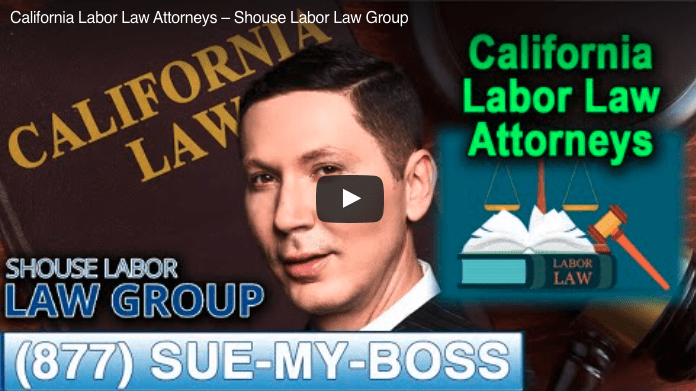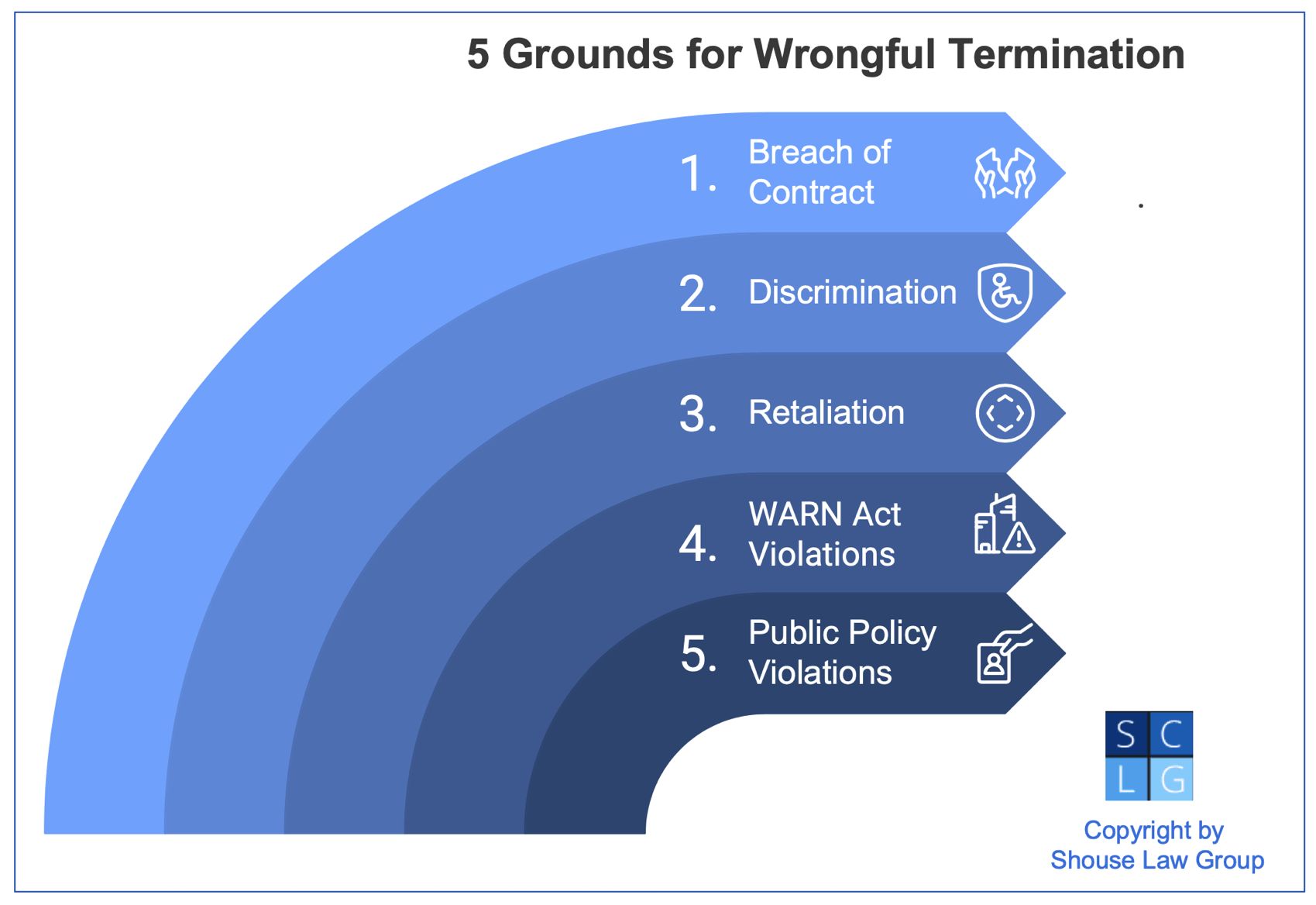
Top California Employment Attorneys Working For You
Employment disputes are almost always David vs. Goliath.
As an employee, you depend on your job for your livelihood. Employers are often corporations or other businesses with ample resources at their disposal.
Many California employment law firms focus on representing employers who can pay large fees upfront. These firms’ “legal strategies” may consist of trying to intimidate you for daring to assert your rights until you go away.
That’s where we come in. The labor and employment law attorneys at Shouse Law Group in California focus on employees – the “little guy.”
We know the ins and outs of workers’ rights laws and how employment litigation works – from settlement negotiations to arbitration agreements to jury trials. We use the system to win you maximum compensation and safeguard your professional standing.
Contact Shouse Law Group for a free consultation today. You do not pay us a cent unless we win your case.
Types of Employment Cases We Handle
The attorneys at Shouse Law Group help employees and plaintiffs in all practice areas of California labor law, including the following employment issues.
Wrongful Termination
California wrongful termination law provides remedies if you lose your job for the wrong reasons.
You are likely an at-will employee. This means your employer can terminate your employment at any time for almost any reason.
Though there are exceptions to at-will employment in California law. If your employer fires you in violation of an implied contract or in violation of public policy, you may have the right to compensation.
You also may have grounds to sue for wrongful termination (or wrongful failure to promote) if you are fired either:
- in violation of the Fair Employment and Housing Act (FEHA),
- as a form of whistleblowing retaliation,
- in violation of the Sarbanes-Oxley Act’s whistleblower protections,
- because of your political speech or activities outside of work,
- as retaliation for a qui tam lawsuit, or
- based on a failure to provide reasonable accommodation if you have a disability.
Furthermore, several California wrongful termination laws prohibit employers from retaliating against you through adverse employment actions other than termination, such as demotions.
Our labor law firm’s approach to wrongful termination cases is meticulous, strategic, and focused on achieving justice for you. We understand that California provides some of the strongest employee protections in the nation, and we leverage this to build a powerful case.

Wage and Hour Law
California wage and hour law requires employers to abide by minimum wage laws and provide meal breaks and rest breaks to non-exempt employees.
Employers must also pay overtime (time and a half) if you are non-exempt. This kicks in when you work more than eight hours in a day or 40 hours in a week.
California employers sometimes try to get out of their wage and hour obligations by:
- misclassifying you as exempt (salaried) when you are really non-exempt (hourly).
- misclassifying you as an independent contractor, and/or
- requiring you to work off the clock.
If you are being overworked or underpaid in violation of California labor law, our wage and hour law attorneys can help you file a claim. You could get compensation for the unpaid wages and unpaid overtime to which you are entitled.
Remember this: Your employer may NOT retaliate against you for bringing a wage and hour complaint or other labor complaints. If they do, we can sue for retaliation as well.
Workplace Harassment
The California Fair Employment and Housing Act (FEHA) protects you from harassment in the workplace.
A common form of workplace harassment is sexual harassment, particularly quid pro quo sexual harassment where a superior conditions a job benefit on you providing them sexual favors.
Another common form of workplace harassment is creating a hostile work environment on the basis of your:
- sex,
- race or ethnicity,
- religion,
- national origin,
- sexual orientation, gender identity, or gender expression,
- age, and/or
- disability.
Also illegal is immigration retaliation, which occurs when an employer threatens to have non-citizen workers deported for speaking out about labor violations.
The California lawyers at Shouse Law Group can advise you on the best course of action if you experience harassment at work.
For most employees experiencing harassment, the first step is to file a complaint with the California Civil Rights Department (CRD) – formerly the Department of Fair Employment and Housing (DFEH). Then you may file a lawsuit against your harasser and/or your employer once the CRD issues you a “right to sue” notice.
Employment Discrimination
California employment discrimination law under FEHA prohibits employers from discriminating against you based on your
- race or ethnicity,
- disability,
- national origin,
- age,
- sex,
- gender,
- sexual orientation,
- pregnancy, or
- religion.
The difference between harassment and discrimination is that harassment involves behavior by supervisors or coworkers that is outside of their job description – such as abusive remarks or sexual propositions.
Discrimination, on the other hand, involves normal job functions – such as hiring, firing, and setting work conditions – that are conducted in a discriminatory manner.
Our lawyers at Shouse Law Group can help you navigate the process of filing a discrimination complaint with CRD. If it comes to that, we can bring a discrimination lawsuit against your employer.
California employers are not permitted to retaliate against you for taking action in response to harassment or discrimination at work.

Victims of employment discrimination may file a discrimination complaint with the CRD.
Family and Medical Leave Laws
As an employee in California, you have the right to various forms of protected family and medical leave under state and federal law.
The California Family Rights Act (CFRA) and federal Family and Medical Leave Act (FMLA) give you the right to take up to twelve (12) weeks of unpaid leave to care for a newborn biological child, a newly adopted child, a seriously ill family member or yourself if you have a serious illness. These family and medical leave laws only apply if:
- You have worked for your employer for at least (1) year;
- You have worked for that employer for at least 1,250 hours in the past year; and
- Your employer has at least 50 employees working within 75 miles of your worksite (for FLMA to apply), or your employer has at least five employees (for CFRA to apply).
If you are expecting a baby, you may have pregnancy disability leave for up to four months when you are incapacitated due to pregnancy or childbirth.
California employment law also requires employers to provide other forms of employee leave, including:
- paid sick leave (some of which may be used to care for an ill family member),
- alcohol and drug rehabilitation leave,
- voting leave,
- leave to serve on a jury or comply with a subpoena,
- leave to obtain or attempt to obtain relief from domestic violence, sexual assault or stalking,
- leave for victims of crime,
- leave to participate in children’s school activities,
- leave to receive literacy education, and
- bereavement leave.
In most cases, employers are required to reinstate you in your previous position when you return from leave.
Our California employment attorneys are dedicated to protecting your right to take legally protected family, medical, or other leave without fear of penalty. When employers interfere with, retaliate against, or deny these rights, we are prepared to take decisive action.
Employee Privacy
Our California employment attorneys are up to date on the latest developments in the complex, emerging field of employee privacy rights.
Some of the major topics in California employee privacy law include:
- Whether employers may videotape you (this is generally okay in public areas of the workplace but not in restrooms, locker rooms or similar private areas).
- Whether employers may monitor your internet usage.
- Whether employers can ask about your criminal records (so-called “ban the box” laws).
- Whether and how an employer can use your medical records and history.
- Drug tests (generally speaking, employers may require drug tests for job applicants but not for employees, unless you are working in safety-sensitive positions or the employer has reason to suspect drug use).
- Whether an employer can check your credit rating.
- An employer’s use and protection of your Social Security Number.
- Your right to make video recordings of occurrences in the workplace.
Our labor and employment law attorneys at Shouse Law Group are committed to helping you protect and enforce your employee privacy rights through the legal process when necessary.
Employment Contracts
Our California labor law lawyers are experienced in spotting situations where your employer may have breached your employment contract. This is common in matters of termination, employee discipline, working conditions, job expectations, or failure to pay hazard duty pay. You have the right to take action in that situation.
We also help protect your rights when your employment contract restricts your behavior. For example, your contract may contain an IP ownership clause stating that your employer owns the intellectual property (patent or copyright) of any innovations or inventions you create while working for the employer.
We fight for employees by either suing the employer for breach of contract when they fail to honor their promises or by challenging the legality of unfair and unenforceable terms, such as unlawful non-compete clauses, to void those provisions.

You may be able to sue your employer for breach of contract.
California Employment Law and Immigration
It is a sad fact that employers sometimes take advantage of immigrant employees. If you are in the United States on a visa sponsored by your employer – such as an H-1B visa – you may be wary about asserting your rights or feel that you “owe” your employer for sponsoring you, especially if you wish for your visa to be renewed.
Fortunately, California labor laws – including wage/hour laws and prohibitions against harassment and discrimination – apply to ALL employees, including documented and undocumented immigrants.
Our employment attorneys protect immigrant employees by using California’s powerful laws to sue employers for wage theft, unsafe conditions, and discrimination. We fight to recover stolen wages and hold employers accountable, ensuring that an employee’s status cannot be used as a tool for exploitation or retaliation, which carries significant penalties.
Equal Pay Violations
The California Equal Pay Act (CEPA) requires employers to pay workers equal wages for doing substantially similar work unless there is a non-discriminatory reason for the pay gap. Examples of non-discriminatory reasons are:
- experience,
- merit,
- seniority,
- education and training, and
- work product.
Discriminatory – and therefore illegal – reasons for pay gaps are:
- sex,
- race, or
- ethnicity.
If you are the victim of a CEPA violation, we can file a complaint with the California Labor Commissioner or sue your employer in pursuit of twice your back wages. As with any employment law case, our attorneys handle the entire investigation, litigation, and negotiation process.
Employment Litigation
Embarking on a lawsuit, or even threatening a lawsuit, against an employer can be terrifying. You may feel that your job is your home and your coworkers are your family. You also may worry that you will not be able to find a new job if you assert your rights against your current or former employer.
The California employment attorneys at Shouse Law Group are here to help. We are familiar with the processes and procedures for employment litigation, including statutes of limitations for different kinds of employment lawsuits.
We can also assist you in filing complaints with administrative agencies such as the:
- California Labor Commissioner,
- California Civil Rights Department (CRD),
- United States Department of Labor (DOL), and
- United States Equal Employment Opportunity Commission (EEOC).
We can also guide you through arbitration of your employment dispute – something that may be required by your employment contract or may be preferable for you for a number of reasons.
Frequently Asked Questions
Can I sue my employer and still work there?
Yes. Also, California employers generally may not fire you in retaliation. Though before suing, you are advised to consult with a labor attorney.
In most cases, we would try to exhaust all other options before filing a lawsuit. These may include speaking with management and HR and filing a claim with the EEOC or CRD.
You should also arm yourself with evidence of your mistreatment. These could comprise emails, text messages, and contact information of potential witnesses. This evidence will help us fight for your rights.
How long do I have to sue my employer in California?
It depends on the claim. Plus there may be exceptions depending on the case. In general, the statutes of limitations in California are as follows:
|
Employment Claim |
Statute of Limitations to Sue in California |
| Harassment, discrimination, or retaliation | 1 year after the CRD or EEOC gives you a “right to sue” notice |
| Breach of oral contract | 2 years after the breach |
| Failure to pay wages | 3 years after non-payment |
| Breach of a written contract | 4 years after the breach |
Please contact our labor lawyers well before the statute of limitations runs to give us as much time as possible to craft a winning case for you.
Can I get fired based on my appearance?
It depends. FEHA prohibits employment discrimination based on appearance-based characteristics such as race (including hairstyles under the CROWN Act), color, disability, sex, or age. In addition, various California counties have ordinances prohibiting employment discrimination based on other factors, such as weight and height.
Companies can impose dress codes and grooming standards as long as they are consistent. Though if your tattoo or piercing represents your religious beliefs, FEHA arguably should protect you from being fired over it.
If you were fired due to a discriminatory “grooming” or “look” policy, our California labor law attorneys will hold your employer accountable and seek maximum damages possible.

Sexual harassment at work may qualify as a hostile work environment.
How soon does my employer have to pay me if I get laid off or fired? Can I get severance pay?
If you are terminated, California employers must provide your final paycheck on your last day of work.
If you quit without giving notice, the employer has 72 hours to pay you. If you quit with three days’ notice, then employers should pay on your last day of work.
Employers are not obligated to pay severance unless they agreed to do so in a contract or union agreement.
Our California labor attorneys file wage claims with the Labor Commissioner to immediately recover your unpaid final paycheck, and we also seek waiting time penalties, which can equal up to 30 additional days of pay for the employer’s unlawful delay.
Do employers have to notify me before laying me off?
In general, California’s WARN Act requires certain businesses to provide you with 60 days of notice before mass layoffs. Otherwise, employers can terminate you at-will unless the circumstances amount to wrongful termination.
Do I need a lawyer?
Businesses have one objective. To make the most money while paying out as little as possible. So you are at a constant disadvantage.
Our California labor attorneys have years of experience to help even the playing field. We fight for your legal rights and best interests. Without skilled representation fighting for you, you risk getting shortchanged financially.
Here is our typical process:
- Confidential Case Evaluation: We start by listening. You will speak directly with an attorney in a confidential consultation to detail the circumstances of your employment and dismissal. We want to understand the full picture, including your job history, performance, and the specific events that led to your firing.
- Evidence Gathering & Investigation: We immediately get to work gathering critical evidence. This includes requesting your complete personnel file, reviewing performance evaluations, analyzing emails and internal communications, and identifying key witnesses. We dig deep to find evidence of pretext—the true, illegal reason you were let go.
- Legal Analysis: Our attorneys analyze your case under California’s specific laws, such as the FEHA, public policy exceptions, or laws prohibiting retaliation (for example, for whistleblowing or taking protected leave). We identify the specific legal violations and determine the strength of your claim.
- Strategic Action & Advocacy: We handle all communications with your former employer. We typically start by sending a strong demand letter outlining the legal violations and seeking a resolution. If the employer is unwilling to negotiate a fair settlement, our experienced trial lawyers are fully prepared to file a lawsuit and fight for you in court.
Our primary goal is to hold your employer accountable and recover the maximum compensation you are entitled to, including lost wages, emotional distress, and potential punitive damages.

An experienced labor attorney maximizes the odds of success in your case.
Contact Us For A Free Consultation
Our California labor and employment law attorneys know that every employment case is different. We want to hear your full story so that we can determine the best strategy for your issues.
Call us at (877) SUE-MY-BOSS or use the contact form on this page to schedule a free consultation for legal advice and our legal services.
Our labor and employment law firm represents clients all throughout California such as Los Angeles, San Diego, Orange County, Riverside, San Bernardino, Ventura, San Jose, Santa Clara, Oakland, the San Fernando Valley, Sacramento, San Francisco, and the Antelope Valley.
Work in Nevada? See our article on our Nevada labor lawyers.

What are my rights as an employee in California?
Ten rights you have in California are: